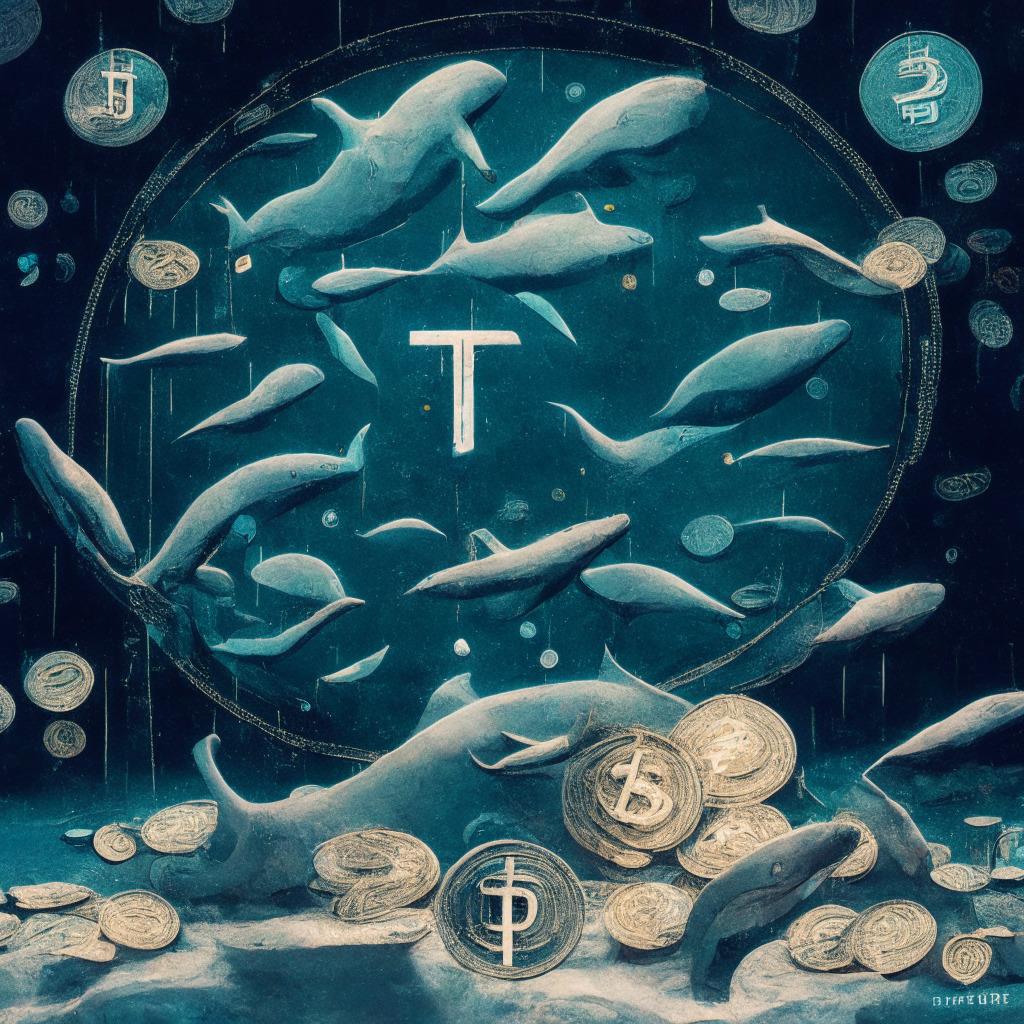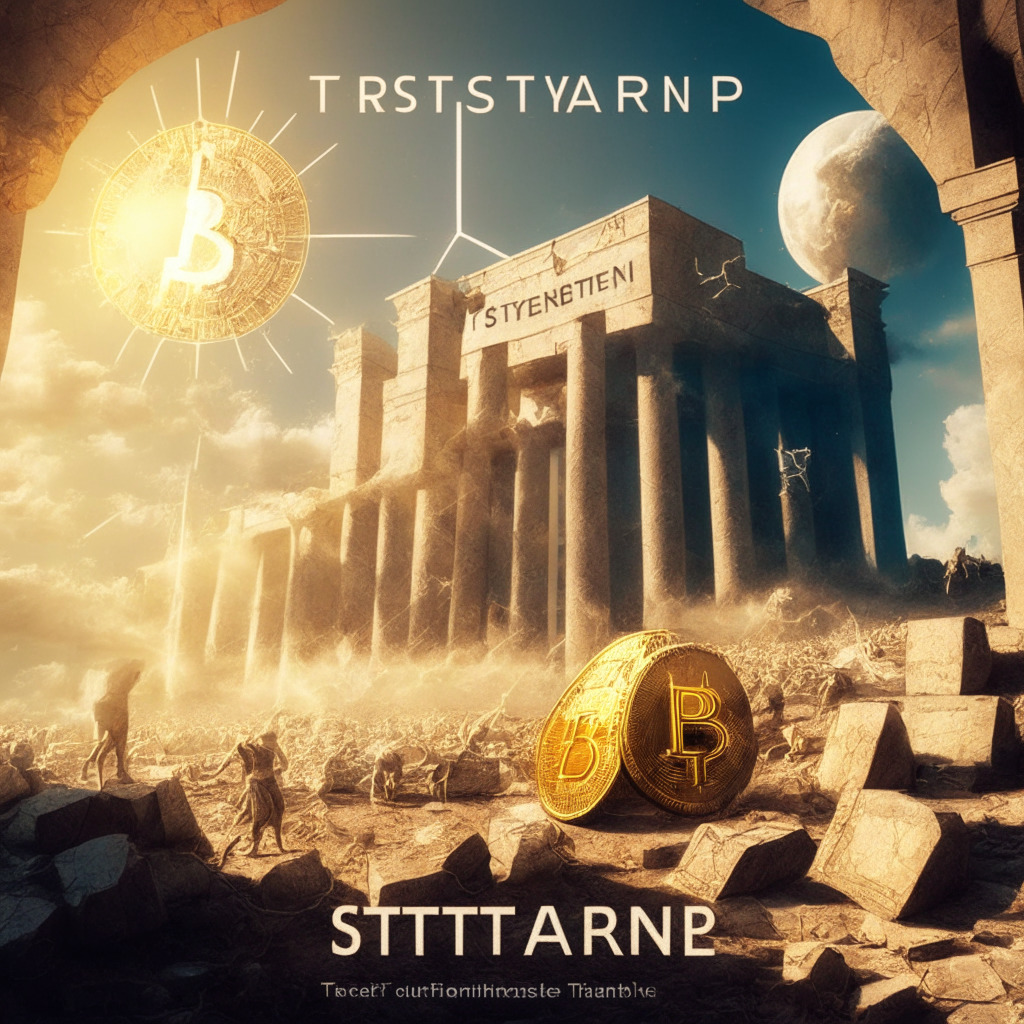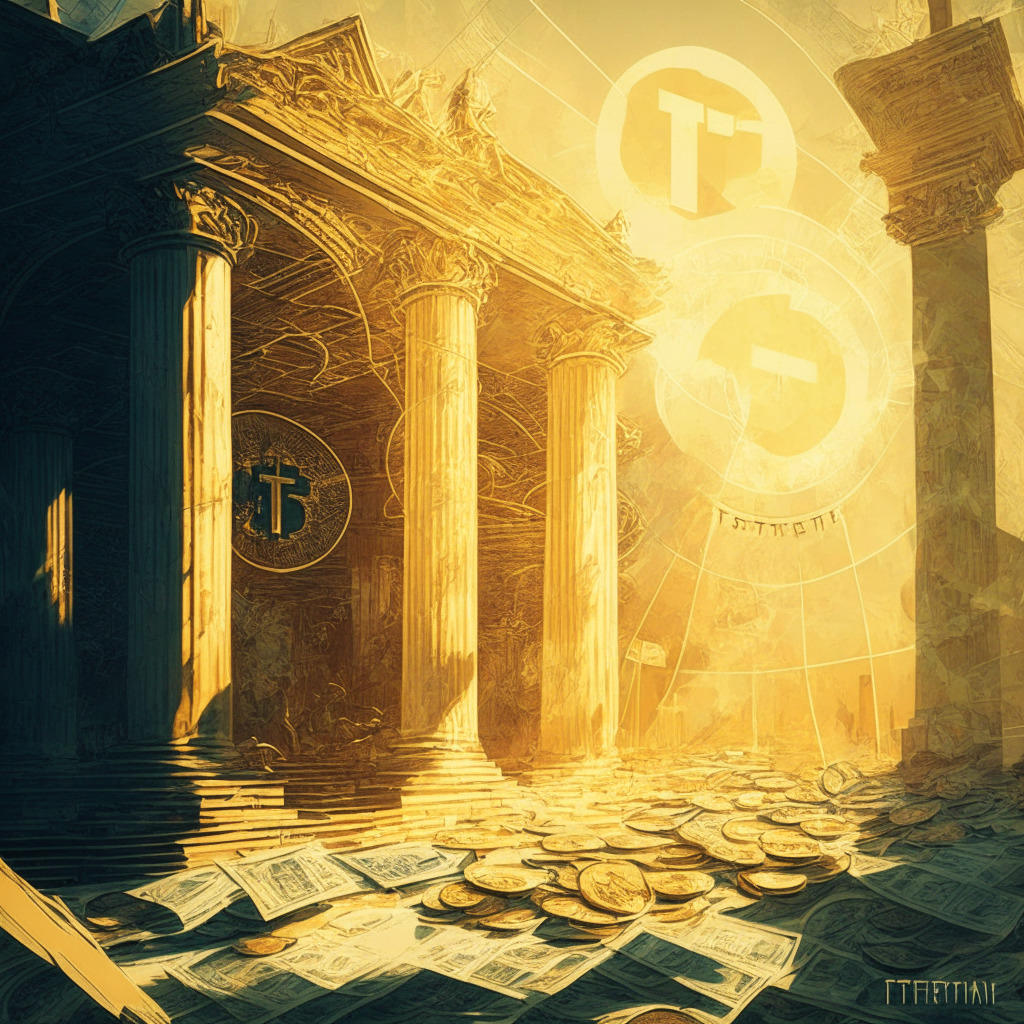“Tether, one of the world’s leading buyers of US Treasury bills, has increased its holdings to $72.5 billion. Despite the complexities expansion brings, this represents the growing mainstream acceptance of digital currencies and their incorporation into the traditional financial world.”
Search Results for: Tether Treasury
Tether’s Rising Treasury Reserves: A Balancing Act between Expansion and Security
“Tether recently disclosed a Q2 attestation, revealing a $3.3 billion jump in its excess reserves. Despite raising market concerns due to increasing U.S. Treasury bill holdings, Tether maintains 100% reserves for USDT tokens and continues growing financially. Transparency around reinvested profits becomes key to investor confidence.”
Tether’s New Link with Bahamas-Based Britannia Bank: A Boon or Bane for the Crypto Industry?
Tether, the issuer of popular stablecoin USDT, has established banking relations with Britannia Bank & Trust. This connection could streamline dollar transfers, improving Tether’s functioning within the traditional financial network. Britannia’s recent acquisitions and positive stance on crypto suggest this relationship is strategic for both entities, impacting the future of the crypto industry.
Tether’s Billion-Dollar Quarterly Profits: Financial Health or Cause for Concern?
“Tether’s self-reported asset value of over $86 billion surpasses the market cap of its USDT stablecoin. While the brand boasts a $1 billion profit, skepticism arose from its financial history and reduced cash holdings, opening conversations about the need for a full-fledged audit.”
Tether’s Booming Stablecoin Reserves: Strategic Masterstroke or Future Liability?
Tether, a recognized stablecoin issuer, saw its reserves surge to $3.3 billion in Q2 2023, showing strategic asset management. The company also reported a 30% quarterly profit increase with earnings exceeding $1 billion. Their portfolio includes other stablecoins and the recent success signifies viable long-term strategies, prompting confidence within the crypto community.
Tether’s Slight Depegging and AAVE’s Curve Freeze: Analyzing the Impact on Stablecoin Markets
Tether (USDT) experienced a slight depegging from its 1:1 ratio with the US dollar, coinciding with AAVE’s decision to freeze Curve (CRV) use as collateral for loans. This prompted whales and investors to capitalize on arbitrage opportunities, leading to Tether’s depegging at $0.996.
Tether Struggles to Maintain Dollar Peg: Impact on Stablecoin Confidence and Markets
Tether (USDT) recently fell below its dollar peg, trading at $0.996, raising concerns among stablecoin users. CTO Paolo Ardoino assured the company’s readiness to face challenges. However, skepticism surrounding Tether’s dollar-backing and decreased investor confidence emphasize the importance of maintaining stablecoin pegs to fiat currencies.
Restoring Trust in Crypto Lending: Tether’s Response to FTX Collapse & Media Skepticism
The FTX exchange collapse has spurred fear and uncertainty in the crypto community. Facing this challenge, Tether, the largest stablecoin issuer, aims to restore consumer faith by ceasing lending from its reserves and emphasizing fully-collateralized loans backed by liquid assets.
Tether’s Record Market Cap: Resilience, Transparency, and Crypto Mining Ventures
Tether’s market cap reaches a new high of $83.2 billion, recovering from a $20 billion loss last year. Its resilience, industry-leading transparency, and recent ventures into crypto mining and sustainable practices contribute to its regained trust and success in the cryptocurrency landscape.
Tether Leverages Uruguay’s Renewable Energy for Bitcoin Mining: Eco-Friendly Progress or Not Enough?
Tether expands into Bitcoin mining in Uruguay, leveraging the country’s 94% renewable energy sources. While reducing ecological footprint, it also raises environmental concerns and emphasizes the importance of balancing innovation with ecological impact.
Tether Reduces Banking Risk & Ripple’s SEC Case Win: Impact on the Crypto Industry
Tether reduced counterparty risk by withdrawing $4.5 billion from banks, reinforcing its USDT stablecoin, while Ripple scored a victory against the SEC in their legal dispute. Simultaneously, security concerns arise as Ledger launches its recovery service for lost seed phrases.
Stable Bitcoin Amid US Debt Crisis: Tether Influence and USD’s Impact on Crypto Market
Bitcoin experiences a modest 1.5% gain as market sentiment gets a boost following President Biden’s confidence in resolving the US debt crisis. Tether’s commitment to purchasing Bitcoin may contribute to recovery, but the strengthening greenback and bearish outlook may provide hurdles.
Tether’s Bitcoin Investment Strategy and Emerging Crypto Projects: Navigating a Dynamic Market
Tether announces plans to allocate up to 15% of its reserves to invest in Bitcoin, citing its robustness and growing popularity. Meanwhile, innovative projects like AiDoge, Conflux, and ecoterra reflect the dynamic nature of the cryptocurrency market. Investors must stay vigilant and make informed decisions to capitalize on this growth.
Tether’s Bitcoin Investment Plans: Confidence in Growth or Transparency Issues?
Tether plans to allocate up to 15% of its net realized operating profits towards investing in Bitcoin, citing its resilience and growth potential. However, concerns over transparency and underlying assets backing stablecoins persist, with some critics questioning Tether’s $1.5 billion worth of Bitcoin reserves.
Tether’s 15% Bitcoin Investment: Pros, Cons, and Future of Stablecoin Regulation
Tether plans to invest 15% of its net profits in Bitcoin to strengthen and diversify its reserves, demonstrating the company’s confidence in the cryptocurrency market. As US lawmakers discuss potential stablecoin legislation, Tether’s bold move could potentially shape the future of the industry.
Tether Boosts Reserves with Bitcoin: Bold Move or Risky Strategy?
Tether plans to strengthen its reserves by investing in Bitcoin (BTC), moving away from US-based government debts. The stablecoin issuer will regularly allocate up to 15% of its net realized operating profits towards purchasing Bitcoin, citing its limited supply, decentralized nature, and widespread adoption as key factors for the decision. Tether’s approach is similar to Microstrategy’s strategy of replacing the U.S. dollar with Bitcoin in its reserves.
Tether’s Bold Bitcoin Investment Strategy: A Wise Choice or Risky Gamble?
Stablecoin issuer Tether plans to allocate up to 15% of realized earnings for Bitcoin acquisition, diversifying its reserves. Skepticism arises over Tether’s choice to self-custody its holdings. The company’s continued investments signal confidence in cryptocurrency’s success and growth, but self-custody concerns persist.
Tether’s Bold Move: Diversifying Reserves with 15% Bitcoin Investment Strategy
Tether plans to allocate up to 15% of realized profits from investments to purchase Bitcoin, aiming to diversify and strengthen its stablecoin reserves. This follows Tether revealing $1.5 billion in BTC and $3.4 billion in gold held among its reserve assets.
Tether’s $4.5B Bank Withdrawal: Reducing Risk & Boosting Crypto Stability
Tether Holdings strategically reduced bank deposits by 90%, withdrawing $4.5 billion and increasing holdings in US Treasury bills. This resulted in an 85% backing for USDT through cash and short-term deposits, while improving transparency and demonstrating the potential of stablecoins in the crypto space.
US Losing Stablecoin Dominance: USDC’s Struggle and the Rise of Tether Threatens Digital Economy
The US may be losing ground in the digital economy as USD Coin (USDC) faces strong competition from Tether (USDT). This shift could undermine US control and expose the Web3 community to less-regulated forces. Policymakers must prioritize Web3 and stablecoins to ensure America’s influence in the digital economy.
Soaring Profits for Tether: Stablecoin Industry Boom and USDT Token Holder Concerns
Tether reported a record profit of $1.48 billion in Q1 2021, attributed to rising interest rates and diversifying its reserves with physical gold and Bitcoin. The stablecoin issuer sees a 20% increase in token circulation, reflecting growing customer trust. However, concerns arise as USDT token holders receive no interest, and companies need to balance profits and customer interests for sustainable growth.
Tether’s Record Profits Amid Transparency Concerns: An In-Depth Analysis of the Stablecoin Giant
Tether announced a net profit of $1.48 billion and a reserve surplus of $2.44 billion. As the company behind USDT, the largest stablecoin, Tether plays a vital role in crypto markets. However, it faces scrutiny over transparency in backing USDT with U.S. dollars and has faced controversies in the past.
Tether’s $1.48B Q1 Profit: Can Success Amid Transparency Concerns Sustain?
Tether reported a $1.48 billion net profit in Q1 2021 and disclosed its $1.5 billion Bitcoin and $3.4 billion gold holdings. Despite scrutiny, Tether’s USDT stablecoin remains a market leader. Increased transparency efforts include reducing secured loans in reserves and providing clearer information on reserve assets.
Tether’s Soaring Reserves: Sign of Trust or Reminder of Controversies?
Tether Holding Limited reported a significant increase in reserves, reaching an all-time high of $2.44 billion in Q1 2023. Despite past controversies surrounding transparency, Tether has enhanced efforts to provide regular attestations and maintain stability, emphasizing the importance of thorough market research before investing in cryptocurrencies.
Stablecoins: Revolution in Progress or Ticking Time Bomb? Unraveling the Crypto Quandary
“In the world of digital assets, the role and impact of stablecoins is increasingly complex. Despite declining holdings in exchanges and concerns about their potential financial instability, Tether-based stablecoin loans have increased in 2023. The place of stablecoins in crypto markets presents an intricate web of contradictions and uncertainties.”
Gold Versus GambleFi: The Battle for a Safe Haven in Uncertain Economic Times
In the midst of global economic uncertainty, gold’s reliability shines while a gold token, XAUT, experiences a market rise implying a bullish sentiment. Emerging prospects like the TG.Casino, a GambleFi project, blending blockchain’s decentralised advantages with casino gaming, are gaining traction.
Unveiling Binance’s $1B Recovery Fund: Generous Aid or Strategic Maneuver?
“Binance’s $1B cryptocurrency recovery fund, the Industry Recovery Initiative (IRI), has reportedly invested only an estimated $30M since its inception, despite large capital commitment. With growing regulatory concerns, unused funds were moved to Binance’s corporate treasury, raising questions about the effectiveness of such recovery initiatives in the evolving blockchain industry.”
Hong Kong’s Regulatory Dilemma: The Price of Protecting Crypto Investors
“Hong Kong is taking steps towards limiting retail stablecoin trading among individual investors due to increasing crypto adoption. Stablecoins’ value is pegged to fiat currencies, providing some stability against crypto turbulence. However, the recent TerraUSD stablecoin collapse underscores the need for stringent regulation to ensure investor protection and maintain price stability.”
The Intricate Web of Illicit Fentanyl Trade Powered by Cryptocurrency
The U.S Treasury’s Office of Foreign Assets Control (OFAC) has targeted several cryptocurrency wallets involved in the illicit trade of fentanyl. Most transactions were conducted via Stablecoins on Ethereum and Tron networks. These wallets, save for one, were hosted on a centralized crypto exchange, allowing the illicit flow of hundreds of thousands of dollars worth of cryptocurrency.
Balancing Act: Supervising AI Vs. Regulating Cryptocurrencies – Who Gets the Upper Hand?
This article discusses a project launched by UNESCO and the Dutch government to study AI supervision across Europe, aiming to develop guidelines from best practices. It also highlights the contrast of some nations focusing heavily on AI regulations, while cryptocurrency protocols, such as for stablecoin transactions, are being neglected. The importance is stressed of striking a balance between embracing technological advances and ensuring proper regulation for consumer protection.
Regulatory Grip Tightens on Crypto: Analyzing the Ripple Case and Crypto Wallets Sanctions
Recently, a motion by the SEC against Ripple hit a roadblock in court due to the regulatory body’s failure to address substantial legal questions. This highlights the complex legal environment surrounding crypto assets. These developments, including new sanctions on crypto wallets, suggest that the road to comprehensive blockchain regulations is fraught with controversy and challenges.
Decoding the Maze: Blockchain Finance, Sanctions and the Eternal Cat-and-Mouse Game
The US Department of Treasury has imposed sanctions on an Ethereum-backed cryptocurrency wallet linked to an international drug trafficking organization, highlighting renewed governmental attention towards illicit activities facilitated via blockchain. This saga exposes pitfalls and successes in the fight for blockchain transparency and safety.































